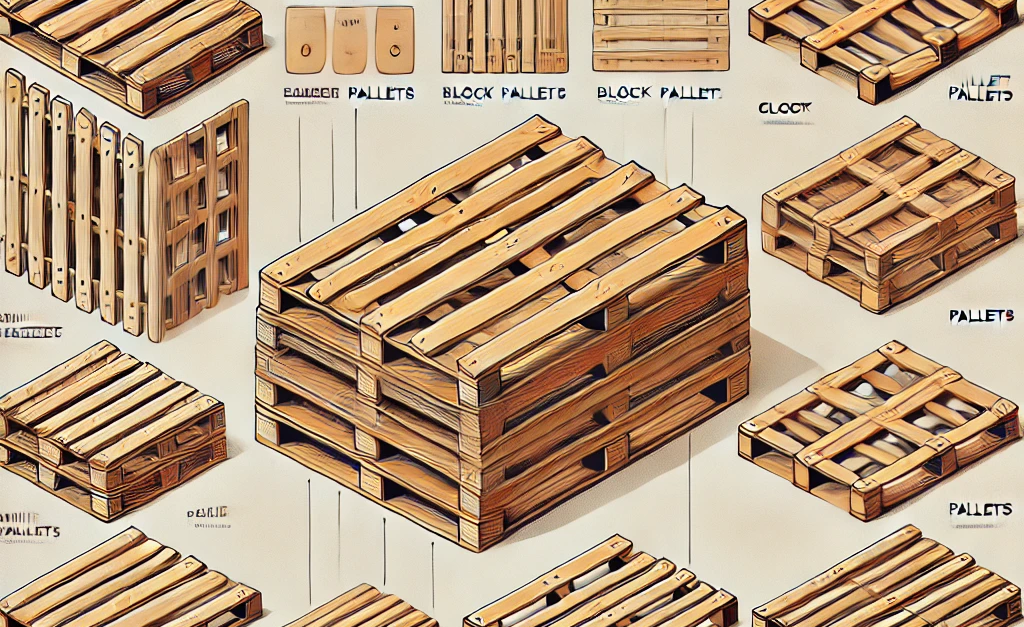
Types of Wooden Pallets: Choosing the Right Solutions
Understanding the types of wooden pallets is essential for businesses that rely on efficient logistics. From transporting goods securely to optimizing storage, wooden pallets offer versatile and sustainable solutions tailored to various industries. This guide, titled “Types of Wooden Pallets: A Comprehensive Guide,” explores the characteristics, applications, and benefits of different types of wooden pallets to help you make informed choices, ensuring your logistics operations are both effective and sustainable.
Understanding Wooden Pallets
Wooden pallets, flat structures designed to support goods during transport or storage, typically use hardwoods like oak or softwoods like pine, providing versatility for various applications. Their durable and customizable design makes them ideal for industries ranging from retail to manufacturing.
Key Characteristics of Wooden Pallets
- Durability: Wooden pallets can withstand heavy loads, ensuring long-term use. Moreover, their sturdy construction makes them reliable for repeated handling and transport.
- Customizability: Businesses can design wooden pallets to meet specific needs, from unique dimensions to load capacities. Additionally, these pallets can be tailored to fit specific supply chain requirements, enhancing operational efficiency.
- Sustainability: Wooden pallets are eco-friendly and can be recycled or repurposed after use. Furthermore, their renewable nature supports environmentally conscious practices.
Exploring Types of Wooden Pallets
1. Stringer Pallets
- Design: Wooden pallets come in various types, including stringer pallets, which use stringers for support and offer two-way or four-way entry configurations.This versatile design provides flexibility in handling and loading methods, making them adaptable to various logistical setups and equipment types.
Applications: These pallets are ideal for general transportation and warehousing needs, offering a practical solution for moving and storing goods efficiently. Additionally, stringer pallets are particularly well-suited for industries that prioritize cost-effective solutions while maintaining high standards of operational efficiency and reliability.
2. Block Pallets
- Structure: Block pallets feature blocks between the top and bottom deckboards, delivering strong support and four-way forklift access. This design ensures exceptional strength and stability, making them perfect for heavy-duty applications.
Best Use: Ideal for transporting heavy loads, block pallets are highly valued in industries demanding efficient handling. Their versatile structure also integrates seamlessly with automated warehouse systems, providing a dependable solution for modern logistics operations.
By understanding these types and their features, businesses can make informed decisions that optimize their logistics and sustainability efforts.
3. Custom Wooden Pallets
- Tailored Designs: Custom pallets are specifically created to fit precise dimensions, weights, and applications, ensuring optimal support and functionality for unique requirements.
Specialized Needs: These pallets are perfect for handling unique goods, such as delicate equipment or oversized items, providing a specialized solution that safeguards products during storage and
Industries That Rely on Wooden Pallets
Food and Beverage
Wooden pallets support perishable goods by maintaining stability during transit and providing storage solutions in temperature-controlled environments.
Pharmaceutical
Custom pallets transport medical supplies and equipment, ensuring compliance with hygiene and safety standards. Types of Wooden Pallets.
Retail
Retailers use wooden pallets for efficient inventory management and product displays in stores.
Benefits of Wooden Pallets
- Cost-Effective: Compared to alternatives like plastic or metal, wooden pallets are affordable and repairable.
- Recyclable: Their recyclability makes them an environmentally responsible choice for businesses.
- Adaptability: Wooden pallets can be modified to meet diverse logistical needs.
Pallet Design and Manufacturing
Custom Solutions
- Innovative Tools: Advanced design software, such as the Pallet Design System (PDS), significantly enhances precision and efficiency in creating types of wooden pallets. These tools enable manufacturers to optimize pallet designs for durability and cost-effectiveness, ensuring they meet industry standards while minimizing material waste.
Collaboration: Manufacturers actively collaborate with clients to develop pallets tailored to specific logistical challenges. This partnership ensures the final product addresses precise operational requirements, offering a customized solution that enhances efficiency and reliability in supply chain management.
Manufacturing Process
- Material Selection: Choosing high-quality wood is vital for crafting durable and dependable types of wooden pallets. This careful selection guarantees consistent performance under heavy loads and meets specific weight and structural demands across diverse industries. Additionally, selecting the right wood enhances pallet longevity and reliability, ensuring optimal functionality in various applications.
Assembly: Skilled teams meticulously assemble pallets to optimize load support. By employing advanced manufacturing techniques, they enhance structural integrity and product longevity, ensuring the pallets can withstand demanding operational conditions while maintaining their usability over time.
Sustainability and Environmental Impact
Wooden pallets play a vital role in supporting sustainability through renewable materials and recyclability. Among the Types of Wooden Pallets, each design contributes to eco-friendly practices by offering reusable and durable solutions. Moreover, their lifecycle aligns seamlessly with environmentally conscious strategies, enabling businesses to reduce their carbon footprint while maintaining efficient logistics operations.
Recycling Benefits
- Recycling significantly extends the lifespan of wooden pallets, ensuring that even at the end of their primary use, they can be transformed into new products like mulch or energy sources. Among the Types of Wooden Pallets, those designed with recyclability in mind play a pivotal role in minimizing waste and contributing to circular economy efforts, promoting sustainable practices across industries.
Eco-Friendly Innovations
- Advanced techniques in pallet manufacturing further enhance the environmental benefits of different types of wooden pallets. For instance, improved wood treatment methods ensure long-term usability while maintaining eco-friendliness. Moreover, innovations in pallet design promote the efficient use of materials, reducing waste and aligning seamlessly with sustainability goals, making wooden pallets an essential component of green logistics.
By integrating custom solutions and sustainable practices, pallet design and manufacturing continue to evolve, supporting businesses in achieving operational efficiency and environmental responsibility.
Conclusion
Choosing the right types of wooden pallets enhances logistics efficiency, protects goods, and supports sustainability. From stringer to custom pallets, understanding their features helps businesses meet industry-specific needs while reducing costs and environmental impact. For tailored solutions, explore services like packing, shipping, palletizing, and custom crating.




